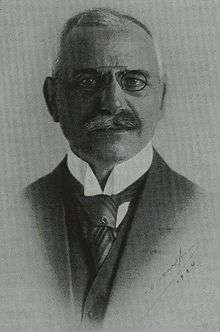Georg Voigt (politician)
Georg Philipp Wilhelm Voigt (16 September 1866 – 13 April 1927) was a German politician. Voigt was the mayor of Rixdorf, Barmen, Frankfurt and Marburg.
Georg Voigt | |
|---|---|
 | |
| Mayor of Barmen | |
| In office 1906–1912 | |
| Preceded by | Johannes Gustav Brodzina |
| Succeeded by | Paul Hartmann |
| Mayor of Frankfurt | |
| In office 1912–1924 | |
| Preceded by | Franz Adickes |
| Succeeded by | Ludwig Landmann |
| Mayor of Marburg | |
| In office 12 February 1925 – 13 April 1927 | |
| Preceded by | Paul Troje |
| Succeeded by | Johannes Müller |
| Personal details | |
| Born | 16 September 1866 Klein-Schellmühl near Danzig, Prussia (Młyniska, Gdańsk) |
| Died | 13 April 1927 (aged 60) Marburg, Weimar Germany |
| Nationality | German |
| Political party | NLP / DDP |
| Alma mater | University of Breslau, Humboldt University of Berlin, University of Königsberg |
Political career
Voigt, the son of a hotelier, was born in Klein-Schellmühl near Danzig, Prussia (Młyniska, Gdańsk). He studied law between 1886 and 1890 at the universities of Breslau (Wrocław), Berlin and Königsberg (Kaliningrad). In 1899, Voigt became the mayor of Rixdorf (nowadays a part of Berlin-Neukölln) and was also the mayor of Barmen between 1906 and 1912, before becoming the mayor of Frankfurt.[1] From 1907, he was a member of the Prussian House of Lords for the National Liberal Party, which later became the German Democratic Party.
Voigt was mayor during the French occupation of Frankfurt 6 April - 17 May 1920. He issued a "Severe Warning" calling on the population to remain calm and follow the requests of the occupying troops following the Hauptwache Incident on 7 April.
After losing the 1924 Frankfurt mayoral elections, Voigt was elected in November of that year to be the mayor of Marburg from February 1925, where he governed until his death in April 1927. He was buried in Berlin-Zehlendorf.
References
- Klemm, Claudia (2007). Erinnert – umstritten – gefeiert: Die Revolution von 1848/49 in der deutschen Gedenkkultur (in German). Göttingen: V&R unipress. p. 245. ISBN 978-3-89971-374-9.
Further reading
- Klötzer, Wolfgang (1996). Frankfurter Biographie: Personengeschichtliches Lexikon. M – Z, Band 2 (in German). Frankfurt: Verlag Waldemar Kramer. ISBN 978-3-7829-0459-9.
